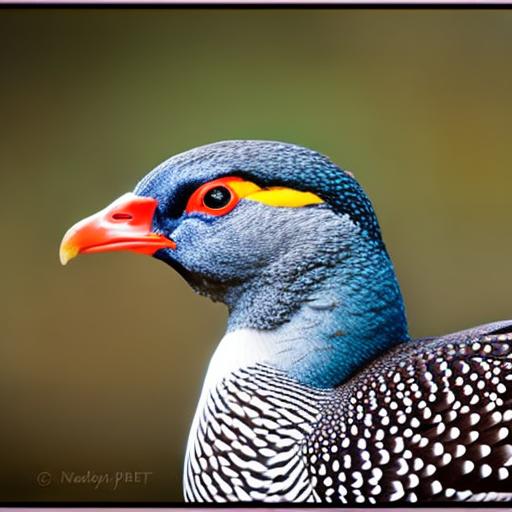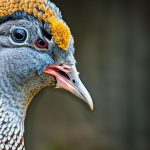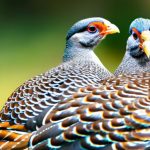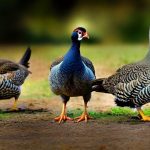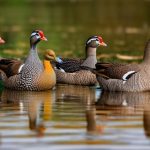Guinea fowl and ducks are both popular poultry choices for small-scale farmers and homesteaders. Guinea fowl, also known as guineas, are native to Africa and are known for their distinctive spotted feathers and loud, chatty calls. They are valued for their insect-eating abilities and are often kept for pest control in gardens and orchards. Ducks, on the other hand, are waterfowl that are known for their webbed feet and waterproof feathers. They are excellent foragers and are often kept for their egg production and meat. Both guinea fowl and ducks are relatively low-maintenance birds that can thrive in a variety of climates and environments.
Guinea fowl and ducks have some similarities in terms of their care requirements, but there are also some key differences between the two species. Understanding these differences is important for anyone considering raising guinea fowl and ducks together. Both guinea fowl and ducks are social animals that thrive in small flocks, but they have different social structures and communication styles. Guinea fowl are highly social birds that form tight-knit groups and are known for their loud calls and vocalizations. Ducks, on the other hand, are more laid-back and tend to be quieter than guinea fowl. Additionally, guinea fowl are ground-dwelling birds that prefer to roost in trees at night, while ducks are more aquatic and require access to water for swimming and foraging. Understanding these differences is important for creating a harmonious environment for both species.
Key Takeaways
- Guinea fowl and ducks are both popular poultry birds known for their pest control abilities and flavorful meat.
- Guinea fowl and ducks can be compatible when raised together, but careful introduction and monitoring is necessary to prevent aggression.
- Guinea fowl and ducks require adequate housing and space to roam, with separate areas for nesting and roosting.
- Both guinea fowl and ducks have specific dietary needs and require access to fresh water at all times.
- Health considerations for guinea fowl and ducks include protection from predators, regular vaccinations, and monitoring for common poultry diseases.
Compatibility of Guinea Fowl and Ducks
Guinea fowl and ducks can be compatible when raised together, but there are some important considerations to keep in mind. Both species have different social structures and communication styles, so it’s important to introduce them to each other gradually to minimize stress and aggression. Guinea fowl are known for their assertive and sometimes aggressive behavior, especially during the breeding season. Ducks, on the other hand, are generally more docile and can be easily intimidated by more assertive birds. To ensure compatibility between guinea fowl and ducks, it’s important to provide plenty of space and resources to minimize competition and aggression. This includes providing multiple feeding and watering stations, as well as ample space for both species to forage and roost.
It’s also important to consider the individual personalities of the birds when introducing guinea fowl and ducks to each other. Some guinea fowl may be more aggressive than others, while some ducks may be more timid or assertive. Observing the birds’ behavior and making adjustments as needed can help ensure a harmonious environment for both species. Additionally, providing plenty of hiding spots and escape routes can help minimize stress and aggression between guinea fowl and ducks. With careful management and observation, guinea fowl and ducks can coexist peacefully and even form close bonds within a mixed-species flock.
Housing and Space Requirements
Guinea fowl and ducks have different housing and space requirements due to their unique behaviors and social structures. Guinea fowl prefer to roost in trees at night, so providing them with access to trees or elevated roosting areas is important for their well-being. Ducks, on the other hand, require access to water for swimming and foraging, so a pond or shallow water source is essential for their health and happiness. When housing guinea fowl and ducks together, it’s important to provide separate areas for roosting and swimming to accommodate the different needs of each species.
In terms of space requirements, both guinea fowl and ducks benefit from having ample room to forage and explore. Guinea fowl are ground-dwelling birds that require plenty of space to roam and forage for insects, seeds, and vegetation. Ducks also benefit from having access to a large outdoor area where they can forage for insects, plants, and small aquatic creatures. Providing at least 10 square feet of outdoor space per bird is recommended for both guinea fowl and ducks to ensure they have enough room to express their natural behaviors.
Feeding and Nutrition
Guinea fowl and ducks have different dietary needs, so it’s important to provide them with appropriate feed and nutrition to support their health and well-being. Guinea fowl are omnivorous birds that primarily feed on insects, seeds, fruits, and vegetation. They are excellent foragers that can help control pest populations in gardens and orchards. In addition to foraging, guinea fowl should be provided with a balanced poultry feed that contains a mix of grains, protein, vitamins, and minerals to meet their nutritional needs.
Ducks are also omnivorous birds that feed on a variety of insects, plants, small aquatic creatures, and grains. They require a diet that is high in protein to support their egg production and overall health. In addition to foraging, ducks should be provided with a commercial duck feed that is specifically formulated to meet their nutritional needs. This feed should contain a balance of protein, vitamins, minerals, and essential fatty acids to support their growth, egg production, and overall health.
When housing guinea fowl and ducks together, it’s important to provide separate feeding stations to minimize competition and aggression between the two species. Additionally, providing access to natural foraging areas where both guinea fowl and ducks can find insects, plants, and small creatures is important for their physical and mental well-being.
Health Considerations
Guinea fowl and ducks are generally hardy birds that are resistant to many common poultry diseases. However, there are some health considerations to keep in mind when raising guinea fowl and ducks together. Both species are susceptible to parasites such as mites, lice, and worms, so regular monitoring and treatment for parasites is important for maintaining their health. Providing clean bedding, regular dust baths, and access to clean water can help minimize the risk of parasite infestations in guinea fowl and ducks.
In addition to parasites, both guinea fowl and ducks are susceptible to respiratory infections, especially in damp or crowded living conditions. Providing a clean, dry living environment with good ventilation is important for preventing respiratory issues in both species. It’s also important to provide regular veterinary care for guinea fowl and ducks to monitor their overall health and address any potential health issues promptly.
When introducing new birds into an existing flock of guinea fowl or ducks, it’s important to quarantine the new birds for a period of time to monitor them for signs of illness or disease. This can help prevent the spread of contagious diseases within the flock and minimize the risk of illness in all birds.
Behavioral Interactions
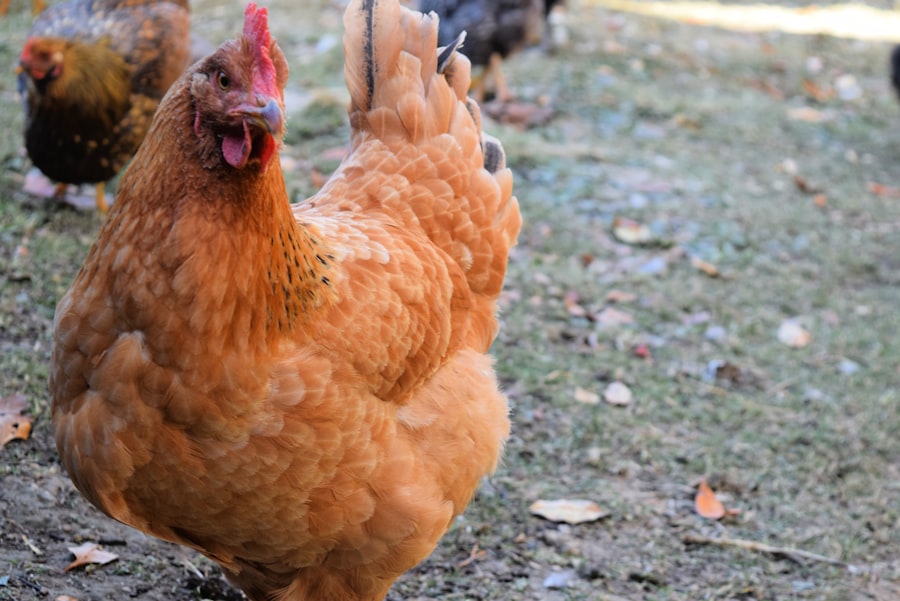
Guinea fowl and ducks have different social structures and communication styles, so it’s important to understand their behaviors and interactions when raising them together. Guinea fowl are highly social birds that form tight-knit groups within a flock. They are known for their loud calls and vocalizations, which they use to communicate with each other and alert the flock to potential threats. Ducks, on the other hand, are generally more laid-back and tend to be quieter than guinea fowl. They communicate through soft quacks, whistles, and body language.
When raising guinea fowl and ducks together, it’s important to provide plenty of space and resources to minimize competition and aggression between the two species. This includes providing multiple feeding stations, watering areas, roosting spots, and hiding places to accommodate the different needs of guinea fowl and ducks. Observing the birds’ behavior and making adjustments as needed can help ensure a harmonious environment for both species.
Despite their differences in social structure and communication styles, guinea fowl and ducks can form close bonds within a mixed-species flock. With careful management and observation, guinea fowl and ducks can coexist peacefully and even engage in mutual grooming or other social behaviors.
Conclusion and Final Considerations
Raising guinea fowl and ducks together can be a rewarding experience for small-scale farmers and homesteaders. Both species have unique characteristics that make them valuable additions to a mixed-species flock. Guinea fowl are excellent insect-eaters that can help control pest populations in gardens and orchards, while ducks are known for their egg production, meat, and ability to forage in water.
When considering raising guinea fowl and ducks together, it’s important to understand their unique behaviors, social structures, housing requirements, feeding needs, health considerations, and behavioral interactions. Providing appropriate housing with separate areas for roosting and swimming, as well as ample outdoor space for foraging is essential for meeting the needs of both species. Additionally, providing appropriate feed that meets the nutritional needs of guinea fowl and ducks is important for supporting their overall health.
By understanding the unique characteristics of guinea fowl and ducks and making adjustments as needed to accommodate their different needs, small-scale farmers can create a harmonious environment where both species can thrive together in a mixed-species flock. With careful management, observation, and attention to detail, raising guinea fowl and ducks together can be a successful endeavor that provides numerous benefits for both the birds and the farmer.
If you’re considering keeping guinea fowl with ducks, you may also be interested in learning about the compatibility of geese with chicken feed. Check out this informative article on poultrywizard.com to discover whether geese can eat chicken feed and how to manage their dietary needs alongside chickens.
FAQs
Can guinea fowl and ducks be kept together?
Yes, guinea fowl and ducks can be kept together in the same enclosure. They generally get along well and can even help to protect each other from predators.
Do guinea fowl and ducks have similar housing and dietary needs?
Guinea fowl and ducks have similar housing needs, as they both require shelter from the elements and protection from predators. However, their dietary needs are slightly different, with guinea fowl being more insect-focused and ducks needing access to water for swimming and foraging.
Are there any potential issues with keeping guinea fowl and ducks together?
One potential issue with keeping guinea fowl and ducks together is that guinea fowl can be more aggressive and territorial, especially during breeding season. It’s important to provide enough space and resources to prevent any conflicts between the two species.
Can guinea fowl and ducks help control pests together?
Yes, guinea fowl and ducks can work together to help control pests on a property. Guinea fowl are known for their insect-eating abilities, while ducks can help control snails, slugs, and other pests in and around water sources.
What are some benefits of keeping guinea fowl and ducks together?
Keeping guinea fowl and ducks together can provide mutual protection from predators, as they can alert each other to potential threats. Additionally, they can work together to help control pests on a property, contributing to a more balanced and natural ecosystem.
Meet Walter, the feathered-friend fanatic of Florida! Nestled in the sunshine state, Walter struts through life with his feathered companions, clucking his way to happiness. With a coop that’s fancier than a five-star hotel, he’s the Don Juan of the chicken world. When he’s not teaching his hens to do the cha-cha, you’ll find him in a heated debate with his prized rooster, Sir Clucks-a-Lot. Walter’s poultry passion is no yolk; he’s the sunny-side-up guy you never knew you needed in your flock of friends!

